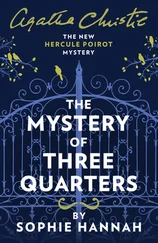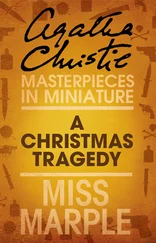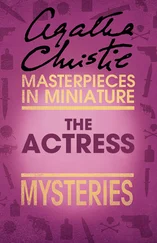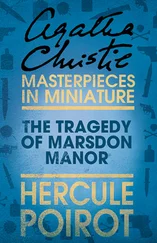Agatha Christie - Three Act Tragedy
Здесь есть возможность читать онлайн «Agatha Christie - Three Act Tragedy» весь текст электронной книги совершенно бесплатно (целиком полную версию без сокращений). В некоторых случаях можно слушать аудио, скачать через торрент в формате fb2 и присутствует краткое содержание. Жанр: Классический детектив, на английском языке. Описание произведения, (предисловие) а так же отзывы посетителей доступны на портале библиотеки ЛибКат.
- Название:Three Act Tragedy
- Автор:
- Жанр:
- Год:неизвестен
- ISBN:нет данных
- Рейтинг книги:4.5 / 5. Голосов: 2
-
Избранное:Добавить в избранное
- Отзывы:
-
Ваша оценка:
- 100
- 1
- 2
- 3
- 4
- 5
Three Act Tragedy: краткое содержание, описание и аннотация
Предлагаем к чтению аннотацию, описание, краткое содержание или предисловие (зависит от того, что написал сам автор книги «Three Act Tragedy»). Если вы не нашли необходимую информацию о книге — напишите в комментариях, мы постараемся отыскать её.
Three Act Tragedy — читать онлайн бесплатно полную книгу (весь текст) целиком
Ниже представлен текст книги, разбитый по страницам. Система сохранения места последней прочитанной страницы, позволяет с удобством читать онлайн бесплатно книгу «Three Act Tragedy», без необходимости каждый раз заново искать на чём Вы остановились. Поставьте закладку, и сможете в любой момент перейти на страницу, на которой закончили чтение.
Интервал:
Закладка:
“Oh – and – er – what do you think?”
“It doesn’t seem likely,” said Miss Wills.
A little baffled by Miss Wills’s clear lack of interest in the subject Sir Charles started on another tack.
“Did Sir Bartholomew mention a Mrs. de Rushbridger at all?”
“No, I don’t think so.”
“She was a patient in his Home. Suffering from nervous breakdown and loss of memory.”
“He mentioned a case of lost memory,” said Miss Wills. “He said you could hypnotise a person and bring their memory back.”
“Did he, now? I wonder – could that be significant?”
Sir Charles frowned and remained lost in thought. Miss Wills said nothing.
“There’s nothing else you could tell me? Nothing about any of the guests?”
It seemed to him there was just the slightest pause before Miss Wills answered.
“No.”
“About Mrs. Dacres? Or Captain Dacres? Or Miss Sutcliffe? Or Mr. Manders?”
He watched her very intently as he pronounced each name.
Once he thought he saw the pince-nez flicker, but he could not be sure.
“I’m afraid there’s nothing I can tell you, Sir Charles.”
“Oh, well!” He stood up. “Satterthwaite will be disappointed.”
“I’m so sorry,” said Miss Wills primly.
“I’m sorry, too, for disturbing you. I expect you were busy writing.”
“I was, as a matter of fact.”
“Another play?”
“Yes. To tell you the truth, I thought of using some of the characters at the house-party at Melfort Abbey.”
“What about libel?”
“That’s quite all right, Sir Charles, I find people never recognise themselves.” She giggled. “Not if, as you said just now, one is really merciless.”
“You mean,” said Sir Charles, “that we all have an exaggerated idea of our own personalities and don’t recognise the truth if it’s sufficiently brutally portrayed. I was quite right, Miss Wills, you are a cruel woman.”
Miss Wills tittered.
“You needn’t be afraid, Sir Charles. Women aren’t usually cruel to men – unless it’s some particular man – they’re only cruel to other women.”
“Meaning you’ve got your analytical knife into some unfortunate female. Which one? Well, perhaps I can guess. Cynthia’s not beloved by her own sex.”
Miss Wills said nothing. She continued to smile – rather a catlike smile.
“Do you write your stuff or dictate it?”
“Oh, I write it and send it to be typed.”
“You ought to have a secretary.”
“Perhaps. Have you still got that clever Miss – Miss Milray, wasn’t it?”
“Yes, I’ve got Miss Milray. She went away for a time to look after her mother in the country, but she’s back again now. Most efficient woman.”
“So I should think. Perhaps a little impulsive.”
“Impulsive? Miss Milray?”
Sir Charles stared. Never in his wildest flights of fancy had he associated impulse with Miss Milray.
“Only on occasions, perhaps,” said Miss Wills.
Sir Charles shook his head.
“Miss Milray’s the perfect robot. Good-bye, Miss Wills. Forgive me for bothering you, and don’t forget to let the police know about that thingummybob.”
“The mark on the butler’s right wrist? No, I won’t forget.”
“Well, good-bye – half a sec – did you say right wrist? You said left just now.”
“Did I? How stupid of me.”
“Well, which was it?”
Miss Wills frowned and half closed her eyes.
“Let me see. I was sitting so – and he – would you mind, Sir Charles, handing me that brass plate as though it was a vegetable dish. Left side.”
Sir Charles presented the beaten brass atrocity as directed.
“Cabbage, madam?”
“Thank you,” said Miss Wills. “I’m quite sure now. It was the left wrist, as I said first. Stupid of me.”
“No, no,” said Sir Charles. “Left and right are always puzzling.”
He said good-bye for the third time.
As he closed the door he looked back. Miss Wills was not looking at him. She was standing where he had left her. She was gazing at the fire, and on her lips was a smile of satisfied malice.
Sir Charles was startled.
“That woman knows something,” he said to himself. “I’ll swear she knows something. And she won’t say… But what the devil is it she knows?”
22
At the office of Messrs. Speier Ross, Mr. Satterthwaite asked for Mr. Oliver Manders and sent in his card.
Presently he was ushered into a small room, where Oliver was sitting at a writing-table.
The young man got up and shook hands.
“Good of you to look me up, sir,” he said.
His tone implied.
“I have to say that, but really it’s a damned bore.”
Mr. Satterthwaite, however, was not easily put off. He sat down, blew his nose thoughtfully, and, peering over the top of his handkerchief, said:
“Seen the news this morning?”
“You mean the new financial situation? Well, the dollar – ”
“Not dollars,” said Mr. Satterthwaite. “Death. The result of the Loomouth exhumation. Babbington was poisoned – by nicotine.”
“Oh, that – yes, I saw that. Our energetic Egg will be pleased. She always insisted it was murder.”
“But it doesn’t interest you?”
“My tastes aren’t so crude. After all, murder -” he shrugged his shoulders. “So violent and inartistic.”
“Not always inartistic,” said Mr. Satterthwaite.
“No? Well, perhaps not.”
“It depends, does it not, on who commits the murder. You, for instance, would, I am sure, commit a murder in a very artistic manner.”
“Nice of you to say so,” drawled Oliver.
“But frankly, my dear boy, I don’t think much of the accident you faked. No more do the police, I understand.”
There was a moment’s silence – then a pen dropped to the floor.
Oliver said:
“Excuse me, I don’t quite understand you.”
“That rather inartistic performance of yours at Melfort Abbey. I should be interested to know – just why you did it.”
There was another silence, then Oliver said:
“You say the police – suspect?”
Mr. Satterthwaite nodded.
“It looks a little suspicious, don’t you think?” he asked pleasantly. “But perhaps you have a perfectly good explanation.”
“I’ve got an explanation,” said Oliver slowly. “Whether it’s a good one or not, I don’t know.”
“Will you let me judge?”
There was a pause, then Oliver said:
“I came here – the way I did – at Sir Bartholomew’s own suggestion.”
“What?” Mr. Satterthwaite was astonished.
“A bit odd, isn’t it? But it’s true. I got a letter from him suggesting that I should have a sham accident and claim hospitality. He said he couldn’t put his reason in writing, but he would explain them to me at the first opportunity.”
“And did he explain?”
“No, he didn’t… I got there just before dinner. I didn’t see him alone. At the end of dinner he – he died.”
The weariness had gone out of Oliver’s manner. His dark eyes were fixed on Mr. Satterthwaite. He seemed to be studying attentively the reactions aroused by his words.
“You’ve got this letter?”
“No, I tore it up.”
“A pity,” said Mr. Satterthwaite dryly. “And you said nothing to the police?”
“No, it all seemed – well, rather fantastic.”
“It is fantastic.”
Mr. Satterthwaite shook his head. Had Bartholomew Strange written such a letter? It seemed highly uncharacteristic. The story had a melodramatic touch most unlike the physician’s cheerful common sense.
He looked up at the young man. Oliver was still watching him. Mr. Satterthwaite thought: “He’s looking to see if I swallow this story.”
Читать дальшеИнтервал:
Закладка:
Похожие книги на «Three Act Tragedy»
Представляем Вашему вниманию похожие книги на «Three Act Tragedy» списком для выбора. Мы отобрали схожую по названию и смыслу литературу в надежде предоставить читателям больше вариантов отыскать новые, интересные, ещё непрочитанные произведения.
Обсуждение, отзывы о книге «Three Act Tragedy» и просто собственные мнения читателей. Оставьте ваши комментарии, напишите, что Вы думаете о произведении, его смысле или главных героях. Укажите что конкретно понравилось, а что нет, и почему Вы так считаете.












